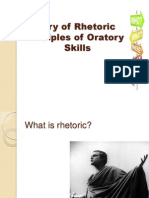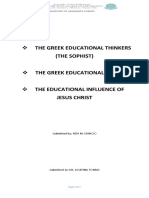0 ratings0% found this document useful (0 votes)
26 viewsAristotle
Aristotle
Uploaded by
Angela NeriThe document summarizes Aristotle's early model of communication from the 4th century BC. [1] Aristotle established an academy to teach rhetoric and saw communication as speaker-centered, with the speaker delivering a message or speech to a passive audience. [2] While Aristotle focused on the speaker and message, he also considered the important role of the setting or context, as this dictated the type of message. [3] The three main settings were legal, deliberative, and ceremonial.
Copyright:
© All Rights Reserved
Available Formats
Download as PPTX, PDF, TXT or read online from Scribd
Aristotle
Aristotle
Uploaded by
Angela Neri0 ratings0% found this document useful (0 votes)
26 views7 pagesThe document summarizes Aristotle's early model of communication from the 4th century BC. [1] Aristotle established an academy to teach rhetoric and saw communication as speaker-centered, with the speaker delivering a message or speech to a passive audience. [2] While Aristotle focused on the speaker and message, he also considered the important role of the setting or context, as this dictated the type of message. [3] The three main settings were legal, deliberative, and ceremonial.
Copyright
© © All Rights Reserved
Available Formats
PPTX, PDF, TXT or read online from Scribd
Share this document
Did you find this document useful?
Is this content inappropriate?
The document summarizes Aristotle's early model of communication from the 4th century BC. [1] Aristotle established an academy to teach rhetoric and saw communication as speaker-centered, with the speaker delivering a message or speech to a passive audience. [2] While Aristotle focused on the speaker and message, he also considered the important role of the setting or context, as this dictated the type of message. [3] The three main settings were legal, deliberative, and ceremonial.
Copyright:
© All Rights Reserved
Available Formats
Download as PPTX, PDF, TXT or read online from Scribd
Download as pptx, pdf, or txt
0 ratings0% found this document useful (0 votes)
26 views7 pagesAristotle
Aristotle
Uploaded by
Angela NeriThe document summarizes Aristotle's early model of communication from the 4th century BC. [1] Aristotle established an academy to teach rhetoric and saw communication as speaker-centered, with the speaker delivering a message or speech to a passive audience. [2] While Aristotle focused on the speaker and message, he also considered the important role of the setting or context, as this dictated the type of message. [3] The three main settings were legal, deliberative, and ceremonial.
Copyright:
© All Rights Reserved
Available Formats
Download as PPTX, PDF, TXT or read online from Scribd
Download as pptx, pdf, or txt
You are on page 1of 7
The first and earliest model is that of Aristotle (5BC), who
was a teacher of Rhetoric and even put up an academy to
produce good speakers. The following is a representation of
his model:
(Listener)
SPEAKE (Message)
AUDIEN
R SPEECH
CE
Aristotle’s Model of Communication
Aristotle (384BC-322BC)
Aristotle was a Greek philosopher and scientist
born in the city of Stagira, Chalkidice, on the
northern periphery of Classical Greece. His
writings cover many subject- including physics,
biology, zoology, metaphysics, logic, ethics,
poetry, rhetoric, etc.
Rhetoric- is the art of discourse, an art that aims
to improve the capability of writers or speaker to
inform, most likely to persuade, or motivate
particular audiences in specific situation. As a
subject formal study and a productive civic
practice, rhetoric has played a central role in the
European tradition.
(Listener)
SPEAKE (Message)
AUDIEN
R SPEECH
A person A formal
CE
The assemble
who address spectators or
or listener at a
speaks public event,
discourse
delivered such as a
to an play, movie,
concert, or
audience
meeting
Aristotle Model is mainly focused on speaker and speech. It is a
speaker centered model as the speaker has the most important role
in it and is the only one active. It is the speaker’s role to deliver a
speech to the audience. The role of the audience is passive,
influenced by the speech. This makes communication process one
way, from speaker to receiver
Although Aristotle focused on the Speaker and Message, the
most important part in his model is the Setting where the
listener is situated. It is the Setting that dictates the Message.
The three setting in Aristotle’s time were legal, deliberative,
and ceremonial.
The Legal Setting meant the courts
where ordinary people defended
themselves (there were no lawyer
then).
The Deliberative Setting meant
the political assemblies, the
highest of which the Roman
Senate.
The Ceremonial Setting meant the celebration held when they
won a war, when they lost a leader or had a new one, and when
they welcomed a visiting leader from another kingdom or
country. Such occasions called for speeches of welcome, poems
of tribute or of eulogies, and poems of lament
You might also like
- Aristotle On Rhetoric James A. Herrick The History and Theory of Rhetoric An Introduction Routledge 2018Document21 pagesAristotle On Rhetoric James A. Herrick The History and Theory of Rhetoric An Introduction Routledge 2018Ana CoutinhoNo ratings yet
- RhetoricDocument22 pagesRhetoricCarlos ArenasNo ratings yet
- Sattler - Conceptions of Ethos in Ancient GreeceDocument12 pagesSattler - Conceptions of Ethos in Ancient GreeceretcmNo ratings yet
- Semiotic Analysis - AbstractDocument40 pagesSemiotic Analysis - Abstractmonata80100% (1)
- Petra Aczel. Visionary RhetoricDocument11 pagesPetra Aczel. Visionary RhetoricAnonymous NPbGa8U4100% (1)
- BionoteDocument4 pagesBionoteAngela Neri100% (1)
- Public Private Partnerships: Presented by Jerry Fay, PEDocument29 pagesPublic Private Partnerships: Presented by Jerry Fay, PEPrav Srivastava100% (1)
- Active To Passive Special FormsDocument1 pageActive To Passive Special FormsFernanda Abreu0% (1)
- The Rhetoric: AristotleDocument9 pagesThe Rhetoric: AristotleGrawp100% (1)
- Greek Rhetoric: Bornilla - Fortun - PlanesDocument30 pagesGreek Rhetoric: Bornilla - Fortun - PlanesPaul CarolinoNo ratings yet
- Purposive 4 Public SpeakingDocument28 pagesPurposive 4 Public Speakingqrztg9kvq5No ratings yet
- 7Kh&Kdoohqjhri7Khrul) Lqjwkh9Rlfhlq3Huirupdqfh: Modern Drama, Volume 52, Number 4, Winter 2009, Pp. 405-425 (Article)Document22 pages7Kh&Kdoohqjhri7Khrul) Lqjwkh9Rlfhlq3Huirupdqfh: Modern Drama, Volume 52, Number 4, Winter 2009, Pp. 405-425 (Article)Mystic-auroraNo ratings yet
- On The Dialogue FormDocument59 pagesOn The Dialogue FormBart MazzettiNo ratings yet
- Historical Timeline of Noteworthy LinguistsDocument16 pagesHistorical Timeline of Noteworthy LinguistsJomaica Mae TamayoNo ratings yet
- FlemingPersuasion StampedDocument35 pagesFlemingPersuasion StampedEdwin BennyNo ratings yet
- Text and Discourse As A Subject of Linguistic StudyDocument38 pagesText and Discourse As A Subject of Linguistic Studysameh23kamalNo ratings yet
- The Rhetoric em Griffin 2018-3Document12 pagesThe Rhetoric em Griffin 2018-3Dee DeeNo ratings yet
- MICHELLE DUNCAN The Operatic Scandal of The Singing Body - Voice, Presence, PerformativityDocument25 pagesMICHELLE DUNCAN The Operatic Scandal of The Singing Body - Voice, Presence, PerformativityGarrison GerardNo ratings yet
- An Elegy For TheoryDocument2 pagesAn Elegy For TheoryB RhieNo ratings yet
- Ge Elec 1 (Compiled PPT - S)Document7 pagesGe Elec 1 (Compiled PPT - S)Princess AngelNo ratings yet
- Classical Rhetoric in Baroque MusicDocument42 pagesClassical Rhetoric in Baroque MusicRuey Yen100% (1)
- Foucault Michel Fearless SpeechDocument92 pagesFoucault Michel Fearless SpeechLuka Culjak100% (2)
- 2021.bitonti Trupia RhetoricDocument7 pages2021.bitonti Trupia RhetoricShams S.NajeemNo ratings yet
- (Rhetorik) Rede Im Zeitalter Der DigitalisierungDocument14 pages(Rhetorik) Rede Im Zeitalter Der DigitalisierungVanessa DonadoNo ratings yet
- Richard Mckeon - Aristotle's Conception of Language PDFDocument15 pagesRichard Mckeon - Aristotle's Conception of Language PDFBernardoBrandaoNo ratings yet
- The Rhetoric of Oratory Imam Ali PDFDocument35 pagesThe Rhetoric of Oratory Imam Ali PDFKenali MaliNo ratings yet
- Schlueter (2012) Composed by CultureDocument4 pagesSchlueter (2012) Composed by Culturesound hourNo ratings yet
- Virtual Classromm Rules: Theory 1 Theory 2 Theory 1 Theory 2Document31 pagesVirtual Classromm Rules: Theory 1 Theory 2 Theory 1 Theory 2Nicole Anne Villanueva PacificoNo ratings yet
- TSD 211 REVIEWER PartialDocument8 pagesTSD 211 REVIEWER PartialascorbicacidceelinplusNo ratings yet
- 04 DiBlas Resources RhetoricDocument6 pages04 DiBlas Resources RhetoricWilliam RincónNo ratings yet
- Speech Theater Arts Midterm CoverageDocument4 pagesSpeech Theater Arts Midterm CoverageRoselyn AlbisoNo ratings yet
- Rhetoric - WikipediaDocument85 pagesRhetoric - WikipediaJames TayoNo ratings yet
- The Show With The VoiceDocument16 pagesThe Show With The VoiceIsadora Annes BitencourtNo ratings yet
- History - An Overview of Classical Rhetoric 1 PDFDocument4 pagesHistory - An Overview of Classical Rhetoric 1 PDFBryant Patrick Dela CruzNo ratings yet
- History of Rhetoric Principles of Oratory SkillsDocument29 pagesHistory of Rhetoric Principles of Oratory SkillsJulieMoisNo ratings yet
- History of Public SpeakingDocument21 pagesHistory of Public Speakingerika NunezNo ratings yet
- Aristotle, and Aristotle's Model of CommunicationDocument8 pagesAristotle, and Aristotle's Model of CommunicationKundan kumarNo ratings yet
- RhetoricDocument21 pagesRhetoricMarto FeNo ratings yet
- English ProjectDocument22 pagesEnglish ProjectaatishNo ratings yet
- Hearing (Hören) Is Defenseless-Without Listening (Hören) : On Possibilities and DifficultiesDocument25 pagesHearing (Hören) Is Defenseless-Without Listening (Hören) : On Possibilities and DifficultieswilamowNo ratings yet
- An Overview of Classical Rhetoric - Origins, Branches, Canons, Concepts, and Exercises PDFDocument2 pagesAn Overview of Classical Rhetoric - Origins, Branches, Canons, Concepts, and Exercises PDFNidharshan Selvaraj RNo ratings yet
- Oral Tradition A DefinitionDocument3 pagesOral Tradition A Definitionshittuebunoluwa0No ratings yet
- marju,+Marling-Saro SissejuhDocument13 pagesmarju,+Marling-Saro Sissejuhphaa4cNo ratings yet
- Elt 7Document8 pagesElt 7Danizelle Kaye Cadocoy BernardoNo ratings yet
- 114-119 SSEI N Aphorisms+Of+The+EnglishDocument6 pages114-119 SSEI N Aphorisms+Of+The+EnglishGolden BoyNo ratings yet
- Ethos, Pathos and Logos in HamletDocument34 pagesEthos, Pathos and Logos in HamletJose DíazNo ratings yet
- Glossary of Terms 100-EILSDocument12 pagesGlossary of Terms 100-EILSSai-na Suzane VelitarioNo ratings yet
- Rhetoric. Homework 1Document7 pagesRhetoric. Homework 1wewe2334No ratings yet
- Public RhetoricDocument26 pagesPublic RhetoricSyakirah Azlan100% (1)
- Adriana Cavarero Vocal BodyDocument15 pagesAdriana Cavarero Vocal BodyNathalia Müller Camozzato100% (1)
- 1911 Encyclopedia Brittanica, S.V "Oratory" Accessesd AprilDocument5 pages1911 Encyclopedia Brittanica, S.V "Oratory" Accessesd Aprilseisuke_kanouNo ratings yet
- Aristotle 11 - de Rhetorica - de Rhetorica Ad Alexandrum - de Poetica - RossDocument366 pagesAristotle 11 - de Rhetorica - de Rhetorica Ad Alexandrum - de Poetica - RossBabilonia Cruz100% (1)
- Cognitive RhetoricDocument9 pagesCognitive RhetoricRobert AntoniuNo ratings yet
- "Voice" and "Address" in Literary Theory: Oral Tradition, 2/1 (1987) : 214-30Document17 pages"Voice" and "Address" in Literary Theory: Oral Tradition, 2/1 (1987) : 214-30CarmenFloriPopescuNo ratings yet
- Socrates ' Versatile Rhetoric and The Soul of The Crowd : Avid ÉvystoneDocument21 pagesSocrates ' Versatile Rhetoric and The Soul of The Crowd : Avid Évystoneapi-516557147No ratings yet
- The Greek Educational ThinkersDocument7 pagesThe Greek Educational ThinkersRiza Macaspac Ignacio100% (1)
- Planes Walls and Bits of Sound Healing A VoiceDocument17 pagesPlanes Walls and Bits of Sound Healing A VoiceHaylana LamarNo ratings yet
- A Cognitive Semiotic Approach To Sound SymbolismDocument51 pagesA Cognitive Semiotic Approach To Sound SymbolismJacek TlagaNo ratings yet
- Training Design Iec Material BSN 409 Grp2b SNDocument17 pagesTraining Design Iec Material BSN 409 Grp2b SNAngela NeriNo ratings yet
- Level 4 Modules For Nursing Skills AuditDocument95 pagesLevel 4 Modules For Nursing Skills AuditAngela NeriNo ratings yet
- Ramirez - Research Scientific PosterDocument1 pageRamirez - Research Scientific PosterAngela NeriNo ratings yet
- Renal Fabs Post Test Answer KeyDocument4 pagesRenal Fabs Post Test Answer KeyAngela NeriNo ratings yet
- Medication Administration Group 2Document32 pagesMedication Administration Group 2Angela NeriNo ratings yet
- @lfnursingcomms - DRUG STUDY FAJARDO ANDREA LAUREN A.Document6 pages@lfnursingcomms - DRUG STUDY FAJARDO ANDREA LAUREN A.Angela NeriNo ratings yet
- OR CommsDocument4 pagesOR CommsAngela NeriNo ratings yet
- Education, by Ellen G. White. Chapter 14 - Science and The BibleDocument4 pagesEducation, by Ellen G. White. Chapter 14 - Science and The BibleAngela NeriNo ratings yet
- Nle FC Manila 2023 May - EDITEDDocument12 pagesNle FC Manila 2023 May - EDITEDAngela NeriNo ratings yet
- @acelleisboring - NCP Risk For AspirationDocument6 pages@acelleisboring - NCP Risk For AspirationAngela NeriNo ratings yet
- Impact of A Modified Nursing Handover ModelDocument9 pagesImpact of A Modified Nursing Handover ModelAngela NeriNo ratings yet
- Sacraments 2Document68 pagesSacraments 2Angela NeriNo ratings yet
- Typhoon Yunya (1991) - WikipediaDocument6 pagesTyphoon Yunya (1991) - WikipediaAngela NeriNo ratings yet
- Chan ReferencesDocument93 pagesChan ReferencesAngela NeriNo ratings yet
- Crash Cart Check ListDocument2 pagesCrash Cart Check ListAngela NeriNo ratings yet
- Training DesignDocument1 pageTraining DesignAngela NeriNo ratings yet
- Program Flow DraftDocument1 pageProgram Flow DraftAngela NeriNo ratings yet
- Introduction To Physical Fitness: Prepared by Professor Elenita LeabresDocument11 pagesIntroduction To Physical Fitness: Prepared by Professor Elenita LeabresAngela NeriNo ratings yet
- Angela P. Neri March 4, 2021 BSN 309 Mad Rle Act # 2Document3 pagesAngela P. Neri March 4, 2021 BSN 309 Mad Rle Act # 2Angela NeriNo ratings yet
- FA#2 Essay - NERI (Elderly Health)Document2 pagesFA#2 Essay - NERI (Elderly Health)Angela NeriNo ratings yet
- Group 2B: A Pulmonary Histoplasmosis CaseDocument58 pagesGroup 2B: A Pulmonary Histoplasmosis CaseAngela NeriNo ratings yet
- Sample Problem Solving ProcessDocument5 pagesSample Problem Solving ProcessAngela NeriNo ratings yet
- (Last) (Given) (Unit/Lot No.) (Bldg. No.) (Street) (Barangay) (Municipality)Document78 pages(Last) (Given) (Unit/Lot No.) (Bldg. No.) (Street) (Barangay) (Municipality)Angela NeriNo ratings yet
- Lactation Common Nutritional Problems and Recommended DietDocument1 pageLactation Common Nutritional Problems and Recommended DietAngela NeriNo ratings yet
- 20CS3234AA - ADC - Project AllocationDocument38 pages20CS3234AA - ADC - Project Allocationsamplemail00111No ratings yet
- 12 KentDocument140 pages12 KentTrường ArsenalNo ratings yet
- HUL213 SyllabusDocument3 pagesHUL213 SyllabuschandramgpmNo ratings yet
- Why SPE Certification 2013Document32 pagesWhy SPE Certification 2013Ola Sowemimo-CurrencyNo ratings yet
- Siti Nilan Binti Harimi CS: Income & Class: HigherDocument3 pagesSiti Nilan Binti Harimi CS: Income & Class: HigherSiti NilanNo ratings yet
- Eprocurement System Government of Himachal PradeshDocument2 pagesEprocurement System Government of Himachal PradeshBrijesh MaityNo ratings yet
- 265298examine This Report On Mobile Vehicle DetailersDocument3 pages265298examine This Report On Mobile Vehicle DetailersbranyauxvqNo ratings yet
- WildlifeDocument2 pagesWildlifeSreerag CbNo ratings yet
- Reviewer Labor RelDocument5 pagesReviewer Labor RelMaricrisNo ratings yet
- MC34063 STmicroDocument23 pagesMC34063 STmicroFady HachemNo ratings yet
- IT Audit ChecklistDocument40 pagesIT Audit ChecklistPatricia Zhonga100% (6)
- Rosetta Stone of Women BehaviourDocument11 pagesRosetta Stone of Women Behaviourgift2umaNo ratings yet
- Lahore School of EconomicsDocument1 pageLahore School of EconomicsJohn MarryNo ratings yet
- WenphilDocument8 pagesWenphilKent Alvin GuzmanNo ratings yet
- Tra Past ReportDocument27 pagesTra Past ReportZamda Haroun100% (1)
- Thesis Report SPREADSDocument54 pagesThesis Report SPREADSAdil A S 191006No ratings yet
- History NotesDocument46 pagesHistory NotesHIU WAI ALICIA LEUNGNo ratings yet
- Bikol Reporter January 10 - 16, 2016 IssueDocument10 pagesBikol Reporter January 10 - 16, 2016 IssueBikol ReporterNo ratings yet
- Self-Instructional Manual (SIM) For Self-Directed Learning (SDL)Document28 pagesSelf-Instructional Manual (SIM) For Self-Directed Learning (SDL)JHAIRA CRES FERNANDEZNo ratings yet
- CH 8 Island Biogeography LabDocument2 pagesCH 8 Island Biogeography LabSantiago HighNo ratings yet
- Lab Assistant: Exam Conducted 4-11-2006Document5 pagesLab Assistant: Exam Conducted 4-11-2006Ricardo CarrollNo ratings yet
- Angeles City vs. Angeles City Electric Corp.Document10 pagesAngeles City vs. Angeles City Electric Corp.Sharmen Dizon GalleneroNo ratings yet
- Maverick Team Maverick, Inc. Purchasing AgentDocument4 pagesMaverick Team Maverick, Inc. Purchasing AgentOscarNo ratings yet
- Power in The Name of JesusDocument3 pagesPower in The Name of JesusnigelNo ratings yet
- Judges Vs JuriesDocument3 pagesJudges Vs JuriesRojan Alexei GranadoNo ratings yet
- FOQUÉ, Richard - Building Knowledge by Design PDFDocument6 pagesFOQUÉ, Richard - Building Knowledge by Design PDFLucas DuqueNo ratings yet
- Sol Gold Int Progress Test Unit 1A Answer KeyDocument2 pagesSol Gold Int Progress Test Unit 1A Answer KeyJulia WitulskaNo ratings yet
- Application For Probation With Motion To Post BailDocument3 pagesApplication For Probation With Motion To Post BailDax MonteclarNo ratings yet


















































































































